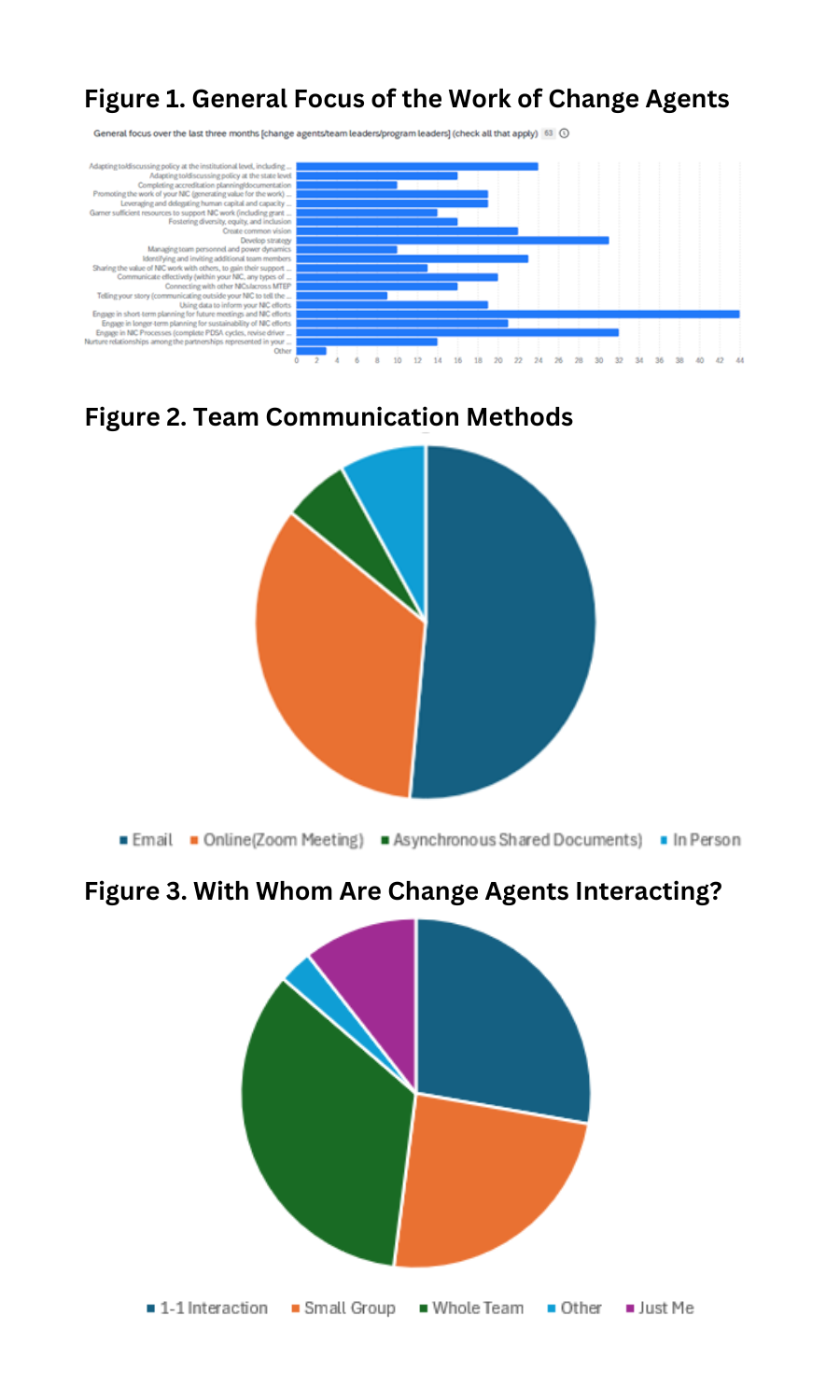
by Alyson E. Lischka, MTEP co-PI, Middle Tennessee team leader, and Research Hub leader; and Dana Franz, MTEP Research Hub member and Mississippi co-leader
Each quarter, the MTEP 2.0 Research Hub gathers information from change agents (program leaders, team leaders, and coaches) related to the work they conduct with their MTEP 2.0 teams. The quarterly survey includes questions about how they communicate within and across teams, who participates in meetings, the focus of the work, and key successes and challenges. This month, we are sharing what we are learning from these surveys about how change agents conduct their work.
First, change agents engage in a variety of areas across many different domains. Figure 1 shows the general focus of change agents’ work in 2024. The two highest numbers of responses are understandably in the areas of short-term planning and engaging in networked improvement community (NIC) processes (such as completing PDSA cycles and revising driver diagrams). These activities are expected of the change agents working with each team. The categories with the two next-highest response rates are developing strategies and adapting to or discussing policy at the institutional level. The high response rates in these categories are not surprising as many of our teams are responding to swift changes in state and local policy that impact work with the preparation of teachers. How are team members contributing to this work? Are you collaborating on NIC processes? Are you working together with your change agent to develop strategies that address the changing policy landscape? How does your MTEP work inform your other work and responsibilities?
In addition to asking what change agents are working on, we asked them how they are communicating with their teams. As shown in Figure 2, approximately 92% of communication among and between teams is taking place remotely. Only 8% of MTEP communication is done in person. Even teams that exist entirely on one campus make use of remote connection tools like email and Zoom to conduct their work. If you are wishing that your team met face to face, know that you are not alone in this aspect of the work. On an interesting note, 38% of the in-person meetings are connecting with each other at conferences or events. For example, some MTEP teams meet in conjunction with their local AMTE affiliate meetings. How can you leverage your state-level activities to bring your MTEP team together?
The work of change agents is not always done in whole team meetings. In fact, Figure 3 shows their work is spread out across whole team meetings (34%), interactions with one other person (28%), meetings with subsets of their team (24%), and individual work (11%). The majority of this work is conducted during interactions with others rather than as tasks completed alone. Who are you interacting with in your MTEP work? Are there ways you should be broadening your communications to further the MTEP work?
We also ask change agents to share their successes and challenges with us. The successes vary greatly in grain size and longevity and include increased attendance at meetings, addition of new partners to teams, completion of multiple PDSA cycles, grant submissions, placement of student teachers with effective mentor teachers, and increased enrollment in programs. In similar variation, the reported challenges include finding time to connect, recruitment and retention, building stronger partnerships, and navigating both policy and personnel changes.
Change agents are engaging in many types of work through a variety of communication modes. The surveys appear to indicate that change agent work is varied but supports the improvement of secondary mathematics teacher preparation. The Research Hub is working on building a database of the submitted PDSA cycles so that change agents can better connect with others doing common work. What additional ways might you engage with your change agents or members of your NIC?